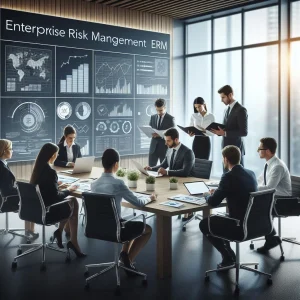Introduction to Audit Scope
In the realm of internal auditing, the concept of audit scope is fundamental to ensuring that audits are effective, efficient, and aligned with organizational goals. The audit scope defines the parameters within which the audit will be conducted, encompassing the objectives, boundaries, and resources necessary for a thorough examination. Understanding these elements is crucial for internal auditors and HR managers, especially as the landscape of work continues to evolve with the rise of remote work.
Defining Audit Scope and Its Importance
Audit scope refers to the specific areas and activities that will be examined during an audit engagement. It serves as the foundation for the entire audit process, guiding auditors in their assessment of internal controls, compliance, and operational efficiency. A well-defined audit scope is essential for several reasons:
- Clarity and Focus: It sets clear expectations for both auditors and auditees, ensuring that all relevant areas are covered while avoiding unnecessary expenditure of time and resources [3].
- Risk Management: By identifying the boundaries of the audit, organizations can better manage potential risks and focus their efforts on critical areas that require attention [7].
- Resource Allocation: A clearly defined scope helps in the effective allocation of resources, ensuring that the audit team can concentrate on high-priority tasks [7].
Traditional Elements Defining Audit Scope
The traditional elements that define audit scope include:
- Objectives: These are the specific goals that the audit aims to achieve, which should be SMART (Specific, Measurable, Achievable, Relevant, Time-bound) [1]. For instance, an objective might be to assess the effectiveness of internal controls in a specific department.
- Boundaries: This refers to the limits of the audit, including what will and will not be included in the examination. Clearly delineating these boundaries helps manage expectations and ensures that the audit remains focused [4].
- Resources: This encompasses the personnel, time, and tools required to conduct the audit effectively. Adequate resource planning is vital to ensure that the audit can be completed within the defined scope [7].
Impact of Remote Work on Traditional Elements
The shift to remote work has introduced new considerations that affect the traditional elements of audit scope:
- Objectives: With teams working remotely, the objectives of audits may need to adapt to address new risks associated with remote operations, such as cybersecurity threats and compliance with remote work policies [10]. Auditors must reassess what they aim to achieve in this new context.
- Boundaries: The boundaries of audits may expand or shift as remote work blurs the lines between different operational areas. For example, auditors may need to consider how remote work impacts collaboration and communication within teams, which could affect internal controls.
- Resources: Remote auditing may require different resources, including technology for virtual meetings and data access. Auditors must ensure they have the necessary tools to conduct audits effectively in a remote environment, which may differ from traditional in-person audits [12].
As organizations navigate the complexities of remote work, understanding the audit scope becomes increasingly important. Internal auditors and HR managers must adapt their approaches to ensure that audits remain relevant and effective in this evolving landscape. By redefining objectives, boundaries, and resource allocation, organizations can maintain robust internal audit processes that support their operational integrity and growth.
The Shift to Remote Work
The rise of remote work has transformed the landscape of many industries, including internal auditing. As organizations increasingly adopt flexible work arrangements, internal auditors must navigate new challenges and adapt their audit scope definition processes accordingly. Here are some key points to consider:
Statistics and Trends in Remote Work Adoption
- Rapid Growth: According to recent studies, remote work has surged, with estimates indicating that over 30% of the workforce in various sectors is now working remotely at least part-time. This trend has been accelerated by the COVID-19 pandemic, which forced many organizations to adopt remote work policies quickly.
- Long-Term Shift: A significant number of companies are planning to maintain remote work options even post-pandemic. Surveys show that approximately 70% of employees prefer flexible work arrangements, prompting organizations to rethink their operational strategies and workforce management.
Challenges Remote Work Introduces to Internal Audit Processes
- Communication Barriers: Remote work can create challenges in communication and collaboration among audit teams and stakeholders. The lack of face-to-face interactions may hinder the flow of information and the ability to conduct thorough discussions about audit objectives and scope.
- Access to Information: Auditors may face difficulties accessing necessary documents and data remotely. This can complicate the audit process, as timely access to information is crucial for effective assessments.
- Increased Risk of Oversight: The shift to remote work can lead to potential oversights in compliance and risk management. Auditors must be vigilant in identifying areas that may be overlooked due to the dispersed nature of teams and operations.
The Necessity for Internal Auditors to Adapt
- Revising Audit Scope: Internal auditors need to redefine their audit scope to account for the unique challenges posed by remote work. This includes identifying new risks associated with remote operations and ensuring that audit objectives are aligned with the current working environment.
- Embracing Technology: Leveraging technology is essential for adapting to remote auditing. Tools for virtual collaboration, data analytics, and remote testing can enhance the efficiency and effectiveness of audit processes.
- Continuous Learning: Internal auditors must stay informed about the evolving landscape of remote work and its implications for audit practices. This includes understanding new regulations, compliance requirements, and best practices for conducting audits in a remote setting.
The shift to remote work presents both challenges and opportunities for internal auditors. By adapting their audit scope and embracing new technologies, auditors can ensure that they remain effective and relevant in this changing environment.
Re-evaluating the Audit Scope Definition Process
In the evolving landscape of remote work, internal auditors must adapt their audit scope definition processes to address new challenges and opportunities. The shift to remote operations has introduced several factors that require careful consideration when defining the scope of an audit. Here are some key points to consider:
New Factors in Defining Audit Scope:
- Technology Reliance: With remote work, organizations increasingly depend on technology for operations. Auditors must assess the risks associated with technology reliance, including cybersecurity threats and the integrity of digital systems. This necessitates a thorough evaluation of the technology infrastructure and its impact on compliance and operational effectiveness [6].
- Remote Access to Data: The ability to access data remotely raises questions about data security and privacy. Auditors need to ensure that appropriate controls are in place to protect sensitive information accessed outside traditional office environments. This includes evaluating remote access protocols and data management practices [5].
- Virtual Collaboration: The shift to virtual collaboration tools has changed how teams communicate and share information. Auditors should consider how these tools affect the flow of information and the potential for miscommunication or data loss. Understanding the dynamics of virtual teamwork is essential for assessing the effectiveness of internal controls [4].
Importance of Stakeholder Input:
- In a remote setting, effective communication with stakeholders becomes even more critical. Auditors must engage with key stakeholders to gather insights and feedback on the audit scope. This collaboration helps ensure that the audit objectives align with organizational priorities and that all relevant risks are considered. Clear communication about the audit’s purpose and limitations is vital to foster trust and transparency among stakeholders [3].
Need for Flexibility in Audit Planning and Execution:
- The dynamic nature of remote work requires auditors to be flexible in their planning and execution. As circumstances change, auditors may need to adjust their scope to address emerging risks or stakeholder requests. This adaptability can help prevent scope creep, which occurs when the audit expands beyond its initial boundaries, potentially leading to increased costs and extended timelines [2][8]. By maintaining a flexible approach, auditors can focus their efforts on high-risk areas while ensuring that the audit remains relevant and effective [6].
The transition to remote work necessitates a re-evaluation of the audit scope definition process. By considering new factors such as technology reliance, remote access to data, and virtual collaboration, engaging stakeholders effectively, and maintaining flexibility, internal auditors can navigate the complexities of remote audits and enhance the overall effectiveness of their audit functions.
Risks and Challenges in Defining Audit Scope Remotely
In the evolving landscape of internal auditing, particularly in the context of remote work, defining the audit scope presents unique challenges and risks that auditors must navigate carefully. Here are some key considerations:
- Data Security and Confidentiality Concerns: Remote audits often involve accessing sensitive information and documents over digital platforms. This raises significant concerns regarding data security and confidentiality. Auditors must ensure that robust cybersecurity measures are in place to protect sensitive data from unauthorized access or breaches. The challenge lies in balancing the need for thorough audits with the imperative to maintain confidentiality, especially when dealing with third-party vendors or remote teams [1][5].
- Inadequate Communication and Engagement with Remote Teams: Effective communication is crucial in the audit process, and remote work can hinder this. The lack of face-to-face interactions may lead to misunderstandings or misinterpretations of audit objectives and scope. Additionally, engaging remote teams can be challenging, as auditors may struggle to build rapport and trust, which are essential for obtaining accurate information and insights. This can result in a lack of clarity regarding the audit scope and objectives, potentially compromising the audit’s effectiveness [2][4][14].
- Potential Oversight of Remote Operations and Controls: Remote work can obscure visibility into operations and internal controls, making it difficult for auditors to assess risks accurately. The physical separation from the workplace may lead to oversight of critical processes and controls that are essential for a comprehensive audit. Auditors must be vigilant in identifying and evaluating these remote operations to ensure that all relevant risks are addressed in the audit scope. This requires a proactive approach to understanding how remote work impacts organizational processes and controls [3][10][11].
While remote work offers flexibility and new opportunities for internal auditors, it also introduces specific risks and challenges in defining the audit scope. Addressing these concerns is vital for ensuring that audits remain effective and relevant in a rapidly changing work environment.
Strategies for Effective Audit Scope Definition in a Remote Context
In the evolving landscape of remote work, internal auditors face unique challenges in defining the audit scope. The shift to remote operations necessitates a reevaluation of traditional audit practices to ensure effectiveness and compliance. Here are actionable strategies for internal auditors to effectively define audit scope amidst the complexities of remote work:
- Utilize Technology to Enhance Communication and Collaboration: Leveraging technology is crucial for maintaining clear communication and collaboration among audit teams and stakeholders. Tools such as video conferencing, project management software, and secure file-sharing platforms can facilitate real-time discussions and document sharing. This ensures that all parties are aligned on audit objectives, scope, and procedures, which is essential for a successful audit process, especially when physical meetings are not feasible [3].
- Implement Continuous Monitoring and Adaptive Audit Techniques: The dynamic nature of remote work environments requires auditors to adopt continuous monitoring practices. By utilizing data analytics and automated tools, auditors can identify risks and anomalies in real-time, allowing for a more responsive audit approach. This adaptability enables auditors to refine the audit scope as new risks emerge, ensuring that the audit remains relevant and focused on high-risk areas [5][7].
- Encourage Ongoing Training and Development for Auditors on Remote Auditing Practices: As remote auditing becomes more prevalent, it is essential for auditors to stay updated on best practices and emerging technologies. Organizations should invest in training programs that focus on remote auditing techniques, including effective use of digital tools, remote interviewing skills, and understanding the implications of remote work on internal controls. Continuous professional development not only enhances auditors’ skills but also fosters confidence in conducting audits in a remote context [10].
By implementing these strategies, internal auditors can effectively navigate the challenges posed by remote work, ensuring that the audit scope is well-defined, comprehensive, and aligned with organizational objectives. This proactive approach not only enhances audit quality but also supports the overall governance and risk management framework within the organization.
Conclusion and Future Outlook
As the landscape of work continues to evolve, particularly with the rise of remote work, the definition and management of audit scope have become increasingly critical for internal auditors. Adapting the audit scope to this new environment is not just a necessity but a strategic imperative. Here are the key takeaways and a forward-looking perspective on audit scope in the context of remote work:
- Importance of Adaptation: The shift to remote work has introduced unique challenges and risks that must be addressed in the audit scope. Auditors need to recognize that traditional audit approaches may not suffice in a remote setting. This requires a reevaluation of what constitutes high-risk areas and a focus on compliance with relevant laws and regulations that may have changed due to remote operations. By defining clear objectives and boundaries, auditors can ensure that their efforts are aligned with the organization’s goals and the realities of a distributed workforce [1][4].
- Proactive Approach: Internal auditors are encouraged to adopt a proactive stance in their audit planning and execution. This means not only responding to immediate risks but also anticipating future challenges that may arise from ongoing remote work practices. Effective communication with stakeholders about the audit’s purpose and scope is essential to foster understanding and support for the audit process [3]. By staying ahead of potential issues, auditors can enhance their credibility and the overall effectiveness of the internal audit function.
- Future Trends: Looking ahead, several trends are likely to shape the future of internal auditing in a remote work context. These include the increased use of technology and data analytics to facilitate remote audits, the need for flexible audit methodologies that can adapt to changing circumstances, and a greater emphasis on cybersecurity and data protection as organizations navigate the complexities of remote operations. Additionally, as remote work becomes more entrenched, auditors may need to develop new frameworks and benchmarks to evaluate processes effectively [2][5][6].
The evolving work environment necessitates a thoughtful and adaptive approach to audit scope. By embracing these changes and preparing for future trends, internal auditors can not only enhance their effectiveness but also contribute significantly to their organizations’ resilience and success in a remote work era.
Find out more about Shaun Stoltz https://www.shaunstoltz.com/about/
This post was written by an AI and reviewed/edited by a human.



